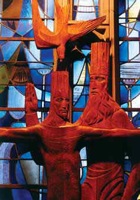Difference between revisions of "Triune"
| Line 4: | Line 4: | ||
[[Latin]] tri- (three) + unus one — more at [[one]] | [[Latin]] tri- (three) + unus one — more at [[one]] | ||
*Date: [http://www.wikipedia.org/wiki/17th_Century 1605] | *Date: [http://www.wikipedia.org/wiki/17th_Century 1605] | ||
| − | + | ||
| − | + | ||
==Description== | ==Description== | ||
In [[theology]], and in [[philosophy]] related to it, trichotomy is the [[belief]] that man consists of three parts; a [[body]], [[soul]], and [[spirit]]. This stands in stark [[contrast]] to [[Duality|dichotomy]]. | In [[theology]], and in [[philosophy]] related to it, trichotomy is the [[belief]] that man consists of three parts; a [[body]], [[soul]], and [[spirit]]. This stands in stark [[contrast]] to [[Duality|dichotomy]]. | ||
Revision as of 23:12, 16 September 2010
Etymology
Latin tri- (three) + unus one — more at one
- Date: 1605
Description
In theology, and in philosophy related to it, trichotomy is the belief that man consists of three parts; a body, soul, and spirit. This stands in stark contrast to dichotomy.
Generally a trichotomy is a three-way classificatory division, and some philosophers pursued trichotomies in particular. Important trichotomies discussed by Aquinas include the causal principles (agent, patient, act) and the acts of the intellect (concept, judgment, reasoning), both rooted in Aristotle; the transcendentals of being (unity, truth, goodness); and the requisites of the beautiful (wholeness, harmony, radiance).
Charles Sanders Peirce built his philosophy on trichotomies and triadic relations based on his trichotomy of categories (firstness: quality of feeling; secondness: reaction, resistance, dyadic relation; and thirdness: representation, triadic relation).
